Navigating the world of limited company accounts can feel overwhelming, especially if you’re a first-time business owner. However, understanding the essentials is crucial for maintaining compliance and ensuring the financial health of your company. This guide breaks down the key aspects of limited company accounts, making the process straightforward and manageable.
1. Financial Reporting Standards and Statutory Accounts
Why It Matters
Financial reporting standards ensure that your company’s accounts are consistent, transparent, and comparable with other companies.
Statutory accounts are the formal accounts that you must submit to Companies House and HMRC. They must comply with accounting standards and legal requirements.
What’s Included
- UK Generally Accepted Accounting Practice (UK GAAP): The standard framework for financial reporting in UK.
- International Financial Reporting Standards (IFRS): Required for some larger companies and those listed on stock exchanges.
- Your accountant will guide you on which standards apply to your company. Make sure they’re using the correct framework when preparing your accounts.
- Profit and Loss Account (Income Statement): Details the company’s income, expenses, and profits or losses over the financial year.
- Balance Sheet: Shows the company’s financial position at the end of the financial year, including assets, liabilities, and shareholders’ equity.
- Notes to the Accounts: Provide additional information and explanations about the figures in the accounts.
- Company Information: Basic details about your company, including registered name, company number, and financial year-end date.
- Directors’ Report: A summary from the directors about the company’s activities, performance, and future prospects.
- Accountant’s Report: If your accounts are audited, this report will be included.
Pro Tip
If you’re a small business, you might be eligible to file simpler statutory accounts, known as ‘micro-entity’ or ‘abridged’ accounts, which reduce the amount of information you need to disclose.
2. Corporation Tax Return
Why It Matters
Every limited company must file a corporation tax return with HMRC, showing how much profit the company has made and the amount of tax owed.
What’s Required
- CT600 Form: The main form used to report your company’s taxable profits and calculate the corporation tax due.
- Supporting Documents: Include your statutory accounts and detailed calculations showing how you arrived at the profit figure.
Pro Tip
Corporation tax is usually due nine months and one day after the end of your accounting period. Set reminders to ensure you don’t miss the payment deadline.
3. Filing Deadlines and Penalties
Why It Matters
Missing filing deadlines can result in penalties and damage your company’s reputation.
Key Deadlines
- Annual Accounts: Must be filed with Companies House within nine months of your company’s financial year-end.
- Corporation Tax Return: Must be filed with HMRC within 12 months of the end of your accounting period.
Penalties
- Late filing of annual accounts can lead to fines ranging from £150 to £1,500, depending on how late they are.
- Late payment of corporation tax incurs interest charges.
Pro Tip
Use accounting software that integrates with HMRC and Companies House to automate reminders and reduce the risk of missing deadlines.
4. Choosing an Accountant
Why It Matters
A qualified accountant can help you navigate the complexities of limited company accounts, ensuring compliance and maximising tax efficiency.
Tips for Choosing
- Experience with Limited Companies: Look for an accountant who specialises in working with limited companies and understands the specific challenges you face.
- Transparent Fees: Ensure the accountant provides clear pricing and details about what’s included in their service.
Pro Tip
Many accountants offer a free initial consultation. Use this opportunity to discuss your needs and gauge their suitability for your business.
5. Record Keeping and Compliance
Why It Matters
Good record-keeping is the foundation of accurate accounting and tax reporting. It’s also a legal requirement for limited companies.
What to Keep
- Financial Records: Include all invoices, receipts, bank statements, and payroll records.
- Company Records: Keep copies of your company’s articles of association, share certificates, and records of director and shareholder meetings.
Pro Tip
Digital record-keeping tools, like cloud-based accounting software, can help you maintain accurate and organised records, making it easier to comply with legal requirements.
6. Directors’ Responsibilities
Why It Matters
As a director, you’re legally responsible for ensuring the company’s accounts are accurate and filed on time. Understanding your duties helps protect you from legal repercussions.
Key Responsibilities
- Ensure Compliance: Make sure the company complies with accounting standards and legal obligations.
- Maintain Accurate Records: Keep thorough and up-to-date financial records throughout the year.
Pro Tip
Regularly review your company’s financial performance and meet with your accountant at least once a quarter to stay on top of your responsibilities.
7. How to Simplify the Process
Why It Matters
Managing limited company accounts can be time-consuming, but with the right tools and processes, you can simplify the task and focus on growing your business.
Tips for Simplification
- Automate: Use accounting software to automate data entry, invoicing, and bank reconciliations.
- Outsource: Consider outsourcing bookkeeping tasks to free up time and ensure accuracy.
Pro Tip
Regularly review your processes and software tools to ensure they’re still meeting your needs as your business grows.
Conclusion
Managing limited company accounts may seem complex, but with a clear understanding of the requirements and the right support, it becomes much more manageable. By staying organised, meeting deadlines, and leveraging professional help, you can ensure your company remains compliant and financially healthy. Remember, your accounts are not just a legal requirement but a valuable tool for understanding and improving your business’s financial performance.
Ready to take control of your limited company accounts? Start by implementing these tips today, and make your accounting process as smooth as possible.










